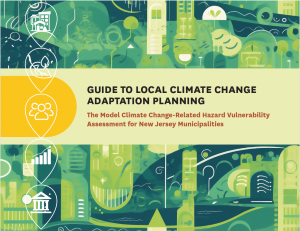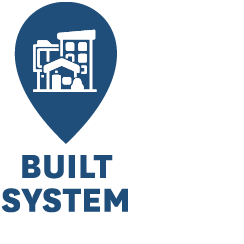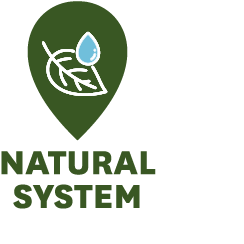Guide to Local Climate Change Adaptation Planning
 Local Action Needed Now
Local Action Needed Now
Prompt local action is needed to ensure that people and communities are less vulnerable to climate hazards affecting us today and tomorrow. Extreme heat, severe storms, and persistent flooding are some of the natural hazards that routinely impact lives, livelihoods, and assets in our region as a result of a rapidly changing global climate. These and other climate change-related natural hazards are projected to increase. Municipalities need to adapt their policies and practices to climate change now to secure a safe and prosperous future for New Jerseyans.
What Towns Can Do
Municipalities can initiate comprehensive climate adaptation through hazard assessments, adaptation planning processes, and purposeful implementation of adaptation actions that make the entire community climate-ready. In fact, municipalities are now required to incorporate climate assessments and strategies into their comprehensive plans. In 2021, the state of New Jersey adopted Senate Bill No. 2607 to enact an amendment to the New Jersey Municipal Land Use Law (MLUL) requiring that municipalities include in the land use plan element of their master plans a “climate change-related hazard vulnerability assessment” that analyzes “current and future threats to, and vulnerabilities of, the municipality associated with climate change-related natural hazards, including, but not limited to increased temperatures, drought, flooding, hurricanes, and sea-level rise…rely[ing] on the most recent natural hazard projections and best available science provided by the New Jersey Department of Environmental Protection.” The amendment requires the vulnerability assessment to include, among other details, an evaluation of the impact of natural hazards in relation to master plan components, strategies and design standards for implementation in response to climate change-related natural hazards, and a policy statement of alignment and consistency with other plans.
Access the Guide to Local Climate Change Adaptation Planning to prepare your municipality for climate change.
The Guide
Working with the NJ Department of Environmental Protection, Sustainable Jersey, and statewide partners, New Jersey Future led development of the Guide to Local Climate Change Adaptation Planning, providing a model Climate Change-Related Hazard Vulnerability Assessment (CCRHVA) and planning process for New Jersey Municipalities that satisfies the requirements of the 2021 MLUL amendment. This guide is intended as a foundational step for ongoing local climate adaptation planning and resilience efforts supported by the NJ Department of Environmental Protection and partner organizations. It is centered on a systems approach that provides a framework for evaluating vulnerability across five systems that support the municipality. The systems approach promotes resilience actions that are centered on long-term sustainability and enhancing the community’s adaptive capacity.





Learn More
Watch the recording of the January 23, 2024 Coffee Chat with NJ Coastal Resilience Collaborative, where presenters representing New Jersey Future, Sustainable Jersey, and the NJ Department of Environmental Protection provided an in-depth overview and answered questions.











